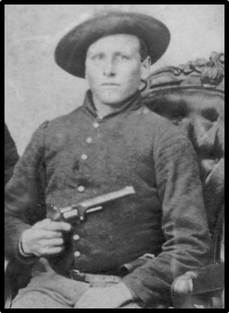The Kyger Barn
 Jacob Kyger of Mill Creek - 35th Iowa Infantry Regiment
Jacob Kyger of Mill Creek - 35th Iowa Infantry Regiment
During the Civil War, the Mill Creek area of Rockingham County was mostly a Dunkard community of peace-loving Brethren. Their strict adherence to Christian non-violence led them to oppose military service of any kind. While the Church refused to take sides during the Civil War, Brethren opposition to slavery certainly set them more at odds with the Confederate cause. The Mill Creek family of Alexander Kyger was often criticized by neighbors because of his wife's outspoken support of abolitionism. Before her death in 1855, Mrs. Kyger rooted these same values in her son, Jacob. Despite his family’s non-violent beliefs, Jacob left the family farm and fled west to join the Union Army. As a sixteen year-old, he was forced to lie about his age in order to join the 35th Iowa Infantry Regiment. Jacob Kyger later saw action at Vicksburg, Mississippi; Nashville, Tennessee; and Mobile, Alabama.
As Jacob fought loyally in the west, the Union Army of the Shenandoah posed a threat to his family farm in Mill Creek, Virginia. With orders from General Grant to destroy the Valley, General Sheridan took the offensive and pursued the Confederate forces under General Jubal Early up the Valley toward the town of Harrisonburg. On September 30th, a cloud of smoke encircled Massanutten Peak as Union soldiers set fire to farms in McGaheysville, Pineville, Cross Keys, Goods Mill, and Mill Creek.
As Jacob fought loyally in the west, the Union Army of the Shenandoah posed a threat to his family farm in Mill Creek, Virginia. With orders from General Grant to destroy the Valley, General Sheridan took the offensive and pursued the Confederate forces under General Jubal Early up the Valley toward the town of Harrisonburg. On September 30th, a cloud of smoke encircled Massanutten Peak as Union soldiers set fire to farms in McGaheysville, Pineville, Cross Keys, Goods Mill, and Mill Creek.
When Union troops approached Alexander Kyger’s barn, the old man pled with them to spare it from the destruction. In addition to professing his own Union sentiments, Kyger showed them a letter from his son, Jacob, who was serving in the Union Army. Despite his loyalty, the soldiers insisted that the barn be destroyed because its stores of grain would supply the Confederate Army. Astonished at their lack of compassion, Mr. Kyger was forced to take a different approach; rather than elevate his cause with appeals to their patriotism, Kyger lowered his efforts by tempting their sobriety. When he offered a keg of brandy as a bribe, the thirsty soldiers gladly accepted and the Kyger barn escaped the flames of 1864.
SOURCES:
Heatwole, John L. The Burning: Sheridan in the Shenandoah Valley. Charlottesville, Virginia: Rockbridge Publishing, 1998.
Heatwole, John L. The Burning: Sheridan in the Shenandoah Valley. Charlottesville, Virginia: Rockbridge Publishing, 1998.
